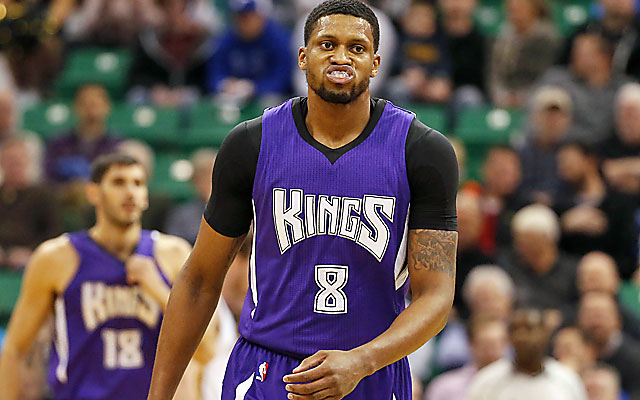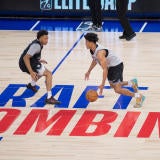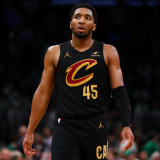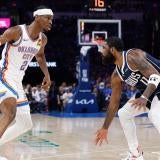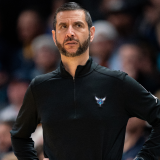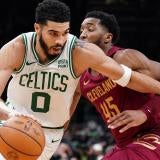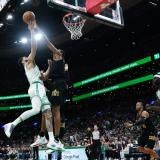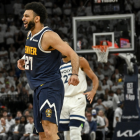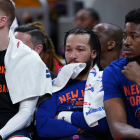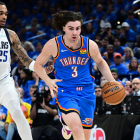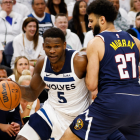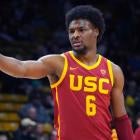Sacramento Kings forward Rudy Gay is reportedly on the trade block, even if the Kings aren't "actively" shopping him, according to ESPN. With the versatile forward available, what kind of deal would make sense in a trade? We're going to take a look.
Before we get started, a few important notes:
1. This is speculation, not reporting. These deals have not been discussed between the involved team, to the best of my knowledge. This is to give you an idea of the kinds of deals that might make sense.
2. Here's what ESPN's Marc Stein said the Kings are looking for in return:
Sacramento is said to be seeking a quality young player in return if it parts with Gay. Or a player they like with at least one year left on his contract after this season, which would give the Kings some insulation against trading for someone in February who turns around and leaves town in July. (Gay, 29, is scheduled to earn $13.3 million from the Kings next season before he's forced to decide on a $14.3 million player option in 2017-18.)In short: Sacramento isn't outright trying to move Gay but would be willing to do so in the proverbial "right deal."
Source: Trade buzz grows as deadline nears - Marc Stein- ESPN.
OK, let's make up some fake trades.
All trades via ESPN's trade machine and have been verified as successful.
1. Kings receive: Corey Brewer, K.J. McDaniels, Terrence Jones; Rockets receive: Rudy Gay

OK, not great, right? I can feel you blanching at this if you're a Kings fan. Or a Rockets fan. Or really anyone. But hear me out! (Get used to that phrase.)
Why the Kings do it: Brewer's best seasons came under George Karl. Outlets from Cousins to Brewer will only tick up Sacramento's already incredibly effective offense. Brewer can shoot a little bit from the corners in a good season, and he's an absolute plus in the locker room -- dude never stops smiling. You could use some positive energy there and Brewer brings it.
K.J. McDaniels is that young prospect that Stein mentioned. McDaniels showed a lot in Philadelphia before Sam Hinkie banished him to his friend Daryl Morey's place and he wound up getting benched into oblivion on a team trying to win a title. McDaniels in Karl's offense should set off fireworks in your head. Unleash him on the run and that's a terrifying prospect. He's getting 3.9 minutes per game in Houston. This is a buy-at-the-lowest-possible point opportunity. Maybe McDaniels is just bad. It's possible. But a lot of times bad players look phenomenal in Karl's system, and if nothing else, McDaniels plays hard. The Kings need guys like that.
Terrence Jones is a restricted free agent this summer and the Kings would have to pay him. So that goes against what they want. But bear in mind that with compromised value, they could get Jones back at a discount, even in this summer's spend-a-palooza. Jones has struggled this season, but even then his overall numbers are solid. Defensively he's been a problem, like, you know, every Houston Rocket that isn't named Dwight Howard, but in Karl's system, he's a better fit than Gay. These are three guys who would do very well for how the Kings are currently constructed.
Of note: The Kings are full up on roster spots, so they'd have to cut some guys and make another trade (like dealing Caron Butler which has been talked about this season). There aren't 14 guys the Kings have to have on roster, but they'd have to make room to do this deal.
Why the Rockets do it: Well, for starters, doing anything isn't a bad plan at this point. You should never do a deal when you're panicking -- unless you're facing the prospect of falling out of the playoffs with one sustained stretch of bad play and your team's defense is a horrible, horrible joke. Adding Gay isn't adding any sort of phenomenal defender, but he's athletic and can play either forward spot, which helps. You pair him with Trevor Ariza and that's a solid forward combo. It's not exactly "Moreyball" given that Gay is shooting 33 percent from 3-point range this season, but he's versatile and can get out in space. Brewer and Jones have struggled on the defensive end to the point that their value probably isn't better than Gay's individual capacity to score.
The Rockets have been chasing a third star and Ty Lawson's definitely not it for them. Maybe their best approach is to add a different dynamic. Gay and Howard also seem like a quality fit if J.B. Bickerstaff were to install some high-low post sets.
2. Kings receive: Kenneth Faried; Nuggets receive: Rudy Gay

Hey, nice and simple, one-for-one. I like simple.
Why the Kings do it: You've probably noticed a pattern of me trying to get Karl's old Denver players over to his new team. That's not exactly the priority of Vlade Divac and the Kings' front office, but if you're going to make a move, this one does a lot for you. While Faried's not a floor spacer or versatile in any respect, and despite a much improved effort this year, remains a subpar defender.
Oh, and Karl constantly had problems with Faried's defesnive effort both in games and in practices.
Excited yet?
But here's the thing, Faried had his best success in Karl's system and legitimately made plays that changed the course of games. He's familiar with Cousins -- and man what a surly combo that would be -- from Team USA and between Boogie and Manimal, no rebounds would be avaliable for the other team, ever. It allows the Kings to play Willie Caulie-Stein at backup PF next to Kosta Koufos and while WCS will need to be a full-time starter at some point, when that time comes you can flip Manimal as needed. Again, it's not ideal, but that should maybe be your takeaway from not only these trades but most scenarios: trades are rarely if ever ideal for both teams.
Why the Nuggets do it: Faried's effort on the defensive end this year has been much improved overall. The problem is that this team doesn't really rim run as much as maybe it should, and they have a serious frontcourt crunch. It's really problematic. With Jusuf Nurkic or Nikola Jokic, you need a smart defender who can hit shots from mid-range next to him, and Faried is the opposite of that. He's an instinctive playmaker defensively who has no ability to stretch the floor.
Michael Malone is open to small-ball and has tried it a healthy amount this year but lineups with Danilo Gallinari at the four are a nightmare defensively. Gay gives them a go-to scorer in crunch time, even if he's inefficient overall, and an athletic small-ball four who you can pair with Gallinari. It makes them better this season and opens up a few more options for what they eventually look for in a Gallinari trade -- should they choose to go that route.
The Nuggets won't improve in efficiency with this deal, but they will improve in production, and that's a step forward. It adds a little bit of money but not enough to really deter them in free agency. Losing Manimal for Gay would mean they get some bad reaction from fans and local media, however.
3. Kings recieve: Victor Oladipo, Jason Smith; Magic receive: Rudy Gay

Why the Kings do it: You get a recent No. 2 overall pick with a lot of upside who's a great defender and a versatile playmaker. Oladipo is exactly the kind of player you would look to target -- a high-upside player who helps them on the defensive end. He's shooting 35 percent from 3-point range, and is a smart playmaker. The Kings might have to send a pick in this deal, which gets problematic given their pick debt situation.
Jason Smith is a player George Karl has long appreciated and it allows them to move WCS into the starting spot full-time while moving Smith to backup PF next to Kosta Koufos.
Why the Magic do it: The wheels have fallen off this season after a positive start to the year, and at some point if you don't think the young core is going in the direction you want, you have to make a move. Trading Oladipo for Gay, effectively, sounds like absolute disaster on the surface. Dipo is young, versatile, and a quality defender, and the Magic have Aaron Gordon and Tobias Harris. Rudy does not make a ton of sense with that combo. But if Gordon's not starting (and he's not right now), pairing Harris with Gay is interesting. Harris has moved off-ball to a much larger degree this season, meaning you can play inside-out with Gay playing power forward offensively and Harris small forward on that end, and then switching it on the opposite end, based on matchups.
Again, this trade works, and makes some sense, but most of it comes down, for Orlando, to how you feel about Oladipo's overall worth and how you feel about his fit next to Elfrid Payton. If Payton is the future and needs the ball in his hands, keeping Oladipo may not make much sense, and it allows them to keep Evan Fournier instead of being forced to deal him.
Alternatively...
4. Kings receive: Evan Fournier, Aaron Gordon, Andrew Nicholson, Jason Smith; Magic receive: Rudy Gay, Ben McLemore, Caron Butler, Quincy Acy

Oh hey, how about we just swap a bunch of bigs and two wings?
Why the Kings do it: Fournier's an expiring, but he'playing time drop by eleven minutes per game under Karl, while Fournier first got minutes under Karl and played well in Denver. Nicholson gives them a stretch four and Smith provides a third center for insurance purposes. Gordon is another big get here, and his athleticism next to Cousins would be phenomenal, especially if he can get his 3-point shot to tick up a bit more (he's shown progress on it).
Also, very quietly... a Willie Caulie-Stein-Aaron Gordon combo would be a great foundation if, hypothetically, they ever needed to trade Cousins.
This of course leaves them light on the wing, so you wonder if a third team might be a good fit to try and make this work a little better. Multi-team trades are difficult, but it might be a good idea. Philadelphia and Robert Covington is an intriguing match.
Why the Magic do it: If you're sold on Tobias Harris after you gave him the big new deal you did last summer, where does Gordon fit in? You can play him at small forward, or Harris at small forward, but it's not a great fit. Gordon is a more athletic, less skilled Harris, so it's a weird combination to have both on the floor. (Gordon-Harris combination lineups are a minus-4 points per 100 possessions, by the way.)
Gay gets you a legit SF to pair with Harris as mentioned above. You're giving up a lot here, including three young players. But both Nicholson and Fournier are free agents this summer and if you're keeping Dipo, it doesn't make sense to keep Fournier, and if you're keeping Harris, it doesn't make much sense to keep Nicholson for big money. This kicks the can down the road while giving you a veteran upgrade to help you win now, and, as an added bonus, McLemore as a prospect who might fit better in a bench capacity than Fournier or Oladipo.
Again, we return to "Man, this is a lot to give up for Rudy Gay" and that's kind of the problem with trading Gay in the first place. You have to give up quite a bit for the Kings to give you their third-best player, but if Gay becomes your second or third-best player, it doesn't necessarily help you that much.

A trade between two teams this close to one another, who are both vying for the same playoff spot? Sure, that'll happen. But if you can get past that, this makes some sense for both sides.
Why the Kings do it: Davis is versatile and productive, and you can play him at either spot. Cousins is going to play big minutes, Koufos' defense and size helps, and WCS is the future. But you can play Davis next to any of those three guys and get productive minutes. He's quietly one of the best value deals from the summer. (Which probably makes you wonder why the Blazers would do this deal. Give me a minute.)
Crabbe is going to be RFA this summer, but like a lot of the other players mentioned above, you want to get a guy with great upside going into that deal. His value is not at peak; Crabbe struggled to get minutes when the Blazers were a playoff contender with the old core. Crabbe's shooting 38 percent from 3-point range. He and Omri Casspi in small-ball lineups would be a phenomenal shooting combo.
Why the Blazers do it: OK, you're Neil Olshey, GM of the Blazers, and you thought you'd tank this year and get a pick, and see what you've got in this young core. Instead, you're in the 8th spot and due to the West's overall "ugh-ness," you have a real chance at making the playoffs. That's not the priority, but if you can get there without sacrificing a real part of your future, what's the problem?
You've got C.J. McCollum, so you've got a 35-minutes-per-night shooting guard. You've got Noah Vonleh who you want to develop, Meyers Leonard, and in the event you don't make the playoffs, a nice pick in the teens. You have Al-Farouq Aminu who you can play at the four as well, next to Gay. That's a pretty complimentary combo, when you factor in Aminu's defense and floor spacing (35 percent from 3-point range). It may seem redundant, but when you factor in skills, it just means more versatility.
Gay wouldn't hold back their core, and his contract will actually look like a bargain next year, relative to the exploding cap. He makes the team a little bit better and they might find a formula that works. Gay's ball-dominant tendencies next to the two guards might be problematic, however.
To sum it all up: These are all ideal trades, ones that provide both sides with a benefit. Most trades don't wind up like this and are often the product of shifting circumstances. Finding teams that would benefit from adding Gay, while giving up assets Sacramento would want, is difficult. Unless Sacramento becomes intent on dealing him, it seems more likely than not that Gay in fact won't be traded at the deadline.
(Watch him be traded the day after this column is posted.)
